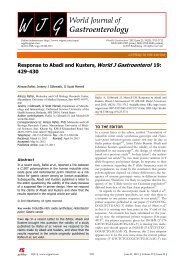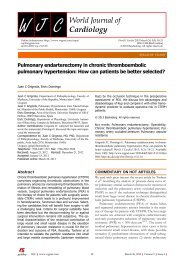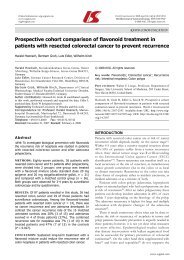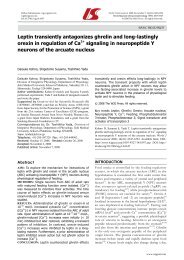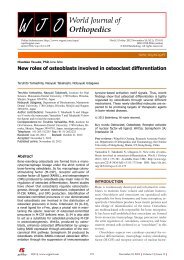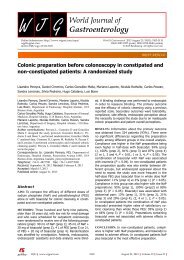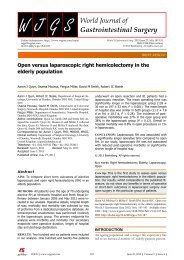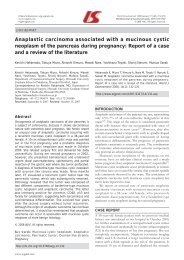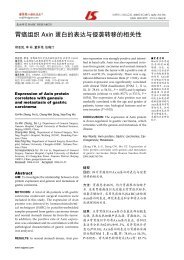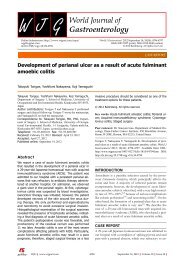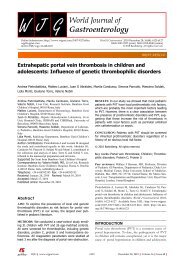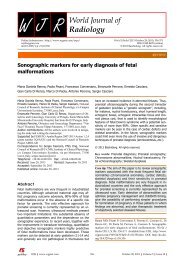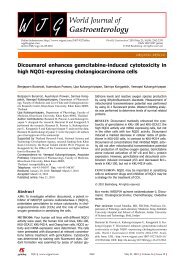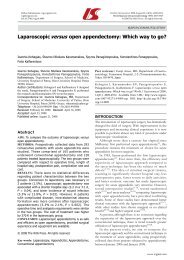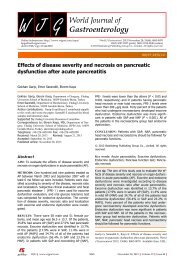Gastrointestinal Oncology - World Journal of Gastroenterology
Gastrointestinal Oncology - World Journal of Gastroenterology
Gastrointestinal Oncology - World Journal of Gastroenterology
You also want an ePaper? Increase the reach of your titles
YUMPU automatically turns print PDFs into web optimized ePapers that Google loves.
Gao Y et al . DNA methylation and colorectal cancer<br />
icine, 1-20-1 Handayama, Higashi-ward, Hamamatsu 431-3192,<br />
Japan<br />
Gao Y, Killian K, Zhang H, Yu K, Li QZ, Weinstein S, Virtamo J,<br />
Tucker M, Taylor P, Albanes D, Meltzer P, Caporaso N. Leukocyte<br />
DNA methylation and colorectal cancer among male smokers.<br />
<strong>World</strong> J Gastrointest Oncol 2012; 4(8): 193-201 Available<br />
from: URL: http://www.wjgnet.com/1948-5204/full/v4/i8/193.<br />
htm DOI: http://dx.doi.org/10.4251/wjgo.v4.i8.193<br />
INTRODUCTION<br />
Although its incidence and mortality have declined in the<br />
past decades, colorectal cancer (CRC) remains the third<br />
most common cancer worldwide [1] . Epigenetic changes,<br />
which affect gene expression and subsequent phenotypes<br />
by mechanisms other than DNA sequence change, have<br />
been shown to play important roles in etiology <strong>of</strong> various<br />
cancers [2] . Studying the roles <strong>of</strong> epigenetic and genetic<br />
factors, as well as their interaction with environmental<br />
exposures, should lead to better understanding on the<br />
pathogenesis <strong>of</strong> CRC, and ultimately contribute to the<br />
prevention and treatment.<br />
DNA methylation, the covalent addition <strong>of</strong> a methyl<br />
group, is an epigenetic event that alters gene expression.<br />
It has a degree <strong>of</strong> dependence on host status, including<br />
age [3,4] and genetic background [5-7] , as well as environmental<br />
exposures, including dietary availability <strong>of</strong> methyl<br />
groups [8] , smoking [9] , and other factors. Variation in DNA<br />
methylation helps explain genetic diversity, which might<br />
mediate gene-environment interaction; mechanistically<br />
it might represent a key mechanism whereby changing<br />
environment modulates gene action. Alterations <strong>of</strong> the<br />
normal DNA methylation pattern, which is unique for<br />
each gene, have been considered an important step in<br />
many human diseases and been associated with all cancers<br />
examined to date, including CRC [2] . Promoter hypermethylation<br />
<strong>of</strong> many genes, associated with silencing<br />
(tumor suppressor genes) or activation (oncogenes) <strong>of</strong><br />
downstream genes, has been linked to CRC carcinogenesis<br />
[10-14] . The key pathways in CRC carcinogenesis, including<br />
loss <strong>of</strong> cell cycle regulation control (p 16INK4α ), silencing<br />
<strong>of</strong> DNA mismatch repair genes (MLH1, MGMT), loss<br />
<strong>of</strong> function <strong>of</strong> apoptosis genes (DAPK), and abolishment<br />
<strong>of</strong> carcinogen metabolism (GSTP1), involve changes in<br />
promoter methylation [15] . Accumulating evidence suggests<br />
that epigenetic, including DNA methylation, abnormalities<br />
are a driving force <strong>of</strong> carcinogenesis [16] . Notably, a<br />
recent study induced cancer in Apc Min/+ mice through<br />
over expressing the de novo DNA methyltransferases Dnmt3a1<br />
and Dnmt3b1 and thereby established a direct causal<br />
connection between DNA hypermethylation and the development<br />
<strong>of</strong> colon tumors [17] . However, evidence for the<br />
role that these mechanisms play in human populations<br />
remains incomplete. Case control studies are unable to<br />
differentiate methylation changes associated with tumor<br />
susceptibility from those changes that derive solely from<br />
tumor progression. For this reason, prospective studies<br />
are needed to examine whether certain DNA methylation<br />
changes precede cancer development.<br />
Notable DNA methylation pattern changes have been<br />
observed in CRC tissue [18-22] , which could classify CRC<br />
molecular subtypes. For example, the CpG island methylator<br />
phenotype (panels <strong>of</strong> four to eight CpG islands) [23-26]<br />
has distinct pathogenic features that could have prognostic<br />
implications and suggest avenues for prevention<br />
or therapy. However to date, prospective data on DNA<br />
methylation and risk <strong>of</strong> incident CRC have not been reported,<br />
and data from non-target tissue, including leukocytes,<br />
are sparse. Study in mice have shown that changes<br />
<strong>of</strong> methylation in leukocyte DNA were parallel those<br />
observed in other somatic tissues [27] . Emerging data suggest<br />
that leukocyte DNA methylation might be linked to<br />
susceptibility <strong>of</strong> bladder cancer [28] , lung cancer [29] , cervical<br />
intraepithelial neoplasia [30] . The study <strong>of</strong> DNA methylation<br />
status in peripheral leukocytes in relation to CRC<br />
risk has mainly been conducted among hereditary nonpolyposis<br />
CRC patients to compare methylation status<br />
between tissues [31-35] . Limited epidemiological studies have<br />
only examined small sets <strong>of</strong> genes [36,37] in case-control<br />
settings. To date, no report has examined the association<br />
between DNA methylation and CRC risk in a prospective<br />
study setting.<br />
We conducted a nested case-control study within the<br />
α-tocopherol, β-carotene (ATBC) cancer prevention study<br />
to explore the relationship between CRC risk and genespecific<br />
DNA methylation from pre-diagnostic leukocytes.<br />
MATERIALS AND METHODS<br />
ATBC study<br />
The ATBC cancer prevention study was a double-blinded,<br />
placebo-controlled, 2 × 2 factorial design trial, which assessed<br />
the effect <strong>of</strong> ATBC, or both, on the incidence <strong>of</strong><br />
cancer in male smokers [38-40] . The prospective cohort comprised<br />
<strong>of</strong> 29 133 Finish men, aged 50-69 years at study<br />
entry (1985-1988), who smoked at least 5 cigarettes per<br />
day. Participants were randomly assigned to groups receiving<br />
ATBC, both supplements, or placebo for 5-8 years until<br />
April 30, 1993 or death. Incident cases were identified<br />
through the Finnish Cancer Registry. Medical records for<br />
each cancer case were reviewed centrally by study physicians<br />
or oncologists for diagnosis confirmation. Questionnaire<br />
based general risk factor, education, family history,<br />
medical history, detailed smoking, and dietary information,<br />
as well as anthropometry, were collected at baseline.<br />
Whole blood biospecimens were collected from subjects<br />
close to the end <strong>of</strong> the intervention (before 1993).<br />
This trial was approved by the institutional review<br />
boards <strong>of</strong> the National Institute for Health and Welfare<br />
<strong>of</strong> Finland and the National Cancer Institute <strong>of</strong> USA. All<br />
participants provided written informed consent.<br />
Study subjects<br />
We conducted a nested case-control study within the<br />
WJGO|www.wjgnet.com 194<br />
August 15, 2012|Volume 4|Issue 8|



